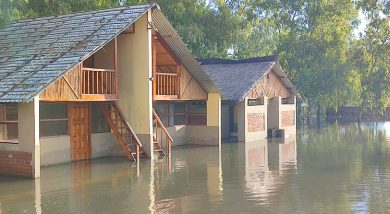Chikondi Shaba: Malawi’s Einstein Forum ambassador
Chikondi Shaba, 27, was recently named Malawi’s ambassador for the Next Einstein Forum (NEF) an initiative that aims at showcasing the contributions of Africa’s brilliant youth to Africa’s scientific emergence.
NEF is a community of scientists, all under the age of 42. As ambassadors, Shaba and the others will highlight the science and technology from their countries and help the forum reach individual audiences.
“I had heard about NEF from a Zimbabwean colleague Dr. Dexter Tagwireyi while studying for my master’s degree in Botswana. He was then the NEF ambassador for Zimbabwe (2015-17). I later participated at the Africa science week at mHub in Lilongwe organised and hosted by Rachel Sibande, founder of mHub, who was also the NEF ambassador for Malawi (2015-17).
mHub is Malawi`s first technology hub. This is an incubator for technology startups with a special focus on building young technology entrepreneurs through training, skills development and mentorship.
“Having met these two people with such strong profiles, I thought I could not make the cut after checking the NEF ambassadors’ page several times over the years. But they encouraged me to apply and after a lot of procrastination [from which I have learnt a lesson], here I am”.
Chikondi was excited thrilled with the thoughts of a million things she could learn and achieve with such an influence and platform.
She could not wait to organise the Africa Science week- promoting the Malawi girls in Science, Technology, Engineering and Mathematics (Stem) initiative, research collaborations, leadership and meeting Nobel Prize winners.
Her joy was also elevated with the prospect of meeting NEF fellow ambassadors at the biennial global gathering scheduled for Kigali, Rwanda in March 2018.
“As ambassador, I have the grand opportunity to lead the week long NEF Africa Science Week in Malawi, targeting primary, secondary and university students and those in transition. Over the two years, I will also be sharing my research and insights, speaking opportunities and research collaborations.
“I also have my set of activities such as establishing centres which provide youth an encouraging and supportive environment to work on Stem projects of their choice, scientific research seminars for college students to bring out that interest in innovation and research and also to civic educate communities on what research is and how beneficial it is to them,” says Chikondi.
With an inherent love for science, Chikondi appreciates the hands-on experience that laboratory hours afforded her throughout her secondary school studies.
She adds that the practicals helped her understand subject content better and aided her to do well in the sciences.
“It was simply exciting and fun. Curiosity nurtured my love for sciences, in particular, Chemistry. It never occurred to me to dislike sciences on the basis of my gender,” she explains.
Her father, the late Edward Shaba was a major driving force in her love for sciences. He was an engineer and his work mostly involved developing sustainable technologies for rural communities.
That inspired her to do the same with chemistry and her interest is to adapt foreign technologies such as mass spectrometry and various analytical techniques which she says can be used in the African setting where resources are limited due to access and inflated pricing.
Currently a Bachelor of Science degree holder and an analytical chemist at Chancellor College, the young woman was born on July 8 1990 to Edward and Mary Shaba [both late]. She is the middle child with an older brother Wongani and a younger brother, the late Edward Junior.
Her primary education started at the age four at Southend Primary School before she moved to Chichiri Primary School for standard seven and eight.
Chikondi was selected to Chichiri Secondary School, but opted for Marymount Catholic Secondary School in Mzuzu where she sat the Malawi School Certificate of Education (MSCE) in 2006, scoring 16 points.
That year, she lost her mother and younger brother in a space of two weeks. She was later selected to the University of Malawi (Unima’s) Chancellor College to pursue a Bachelor of Science which she obtained in 2012 with credit having majored in Chemistry with a minor bias in Statistics.
Since then Chikondi has studied soil and water chemistry, as well as land use and watershed management at the Swedish University of Agricultural Sciences under the Linnaeus-Palme international exchange programme in 2013/2014.
She also studied for a Master of Science in Analytical Chemistry at the University of Botswana under the Africa Development Bank scholarship. She graduated in 2017.
Her first job was in 2012 with Pharmanova Limited as a quality analyst.
“I liked that job so much as it was in the area of Chemistry which I enjoyed most in college analytical chemistry,” she says.
In 2013, the young scientist joined Chancellor College as an associate lecturer in the Chemistry Department. She is currently a lecturer in analytical chemistry and the deputy head of the chemistry department at the college.
Besides that, she is involved in a project under Unima called hidden crisis Unlocking of the Ground Water Potential for the Poor (UPGro) for Malawi, as the chemist responsible for assessing the groundwater chemistry.
“This is an international research programme in Malawi, Uganda and Ethiopia funded by Department for International Development (DfID). Generally, we are looking at groundwater availability and management so it is used in a sustainable manner,” she explains.
Chikondi is also passionate about awareness of Stem careers and girls education. As such, together with her friends, they co-founded Malawi Girls in Science, Technology, Engineering and Mathematics (MaGSTEM) in 2016 and she serves as the secretary general.
“Through this initiative, we provide girls with an opportunity to explore the Stem fields, maximise their academic capacity and instil principles of inquiry, action, and critical thinking.
“MaGSTEM has a vision to create ambassadors for women in Stem and empowering them to become citizens with a global perspective. We have a membership of 25 female college students and Stem professionals to assist in our activities,” she adds.
According to her, the organisation has reached out to 28 schools across Malawi and held a science camp and girls conference with support from FHI360 and Chancellor College.
As a woman in science, she notes that the stereotypes are a challenge, arguing that once one female fails to deliver, the failure is generalised to all women.
“And this is not just by men, but it is done by women too. Sometimes, it’s women against another woman progressing more than they have. Gender is just a social role, but we are individuals, each with their own aspirations and capabilities; people should stop assuming what one can or cannot do, but rather ask that particular person if they can. Seriously, as a country we can do better at empowering each other regardless of gender,” she points out.





